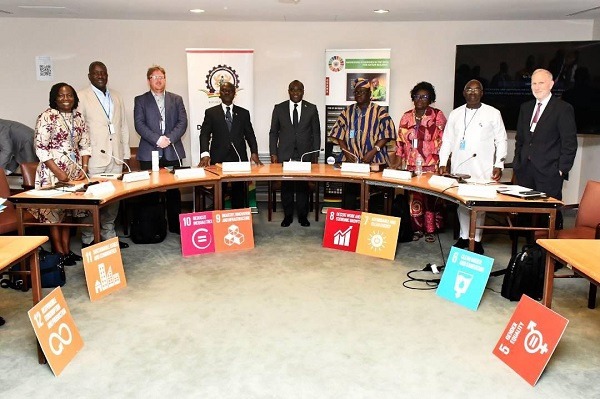Ghana and the University of Sussex in the United Kingdom have hosted a forum to highlight the need to achieve the United Nations Sustainable Development Goal (SDG) Six, which focuses on providing everyone with access to clean water and sanitation.
Dubbed the 2023 UN High-Level Political Forum #HLPF side event, the forum was held at the UN headquarters on July 17 and had representatives from UNICEF in attendance.
It also brought together several countries, including Uganda, to share their experiences, successful strategies, and best practices as well as legislative initiatives to help realise SDG Six.
The forum also discussed the implementation techniques, among others, that have been successful in improving WASH service delivery.
Ghana committed
Addressing the gathering, Ghana’s Permanent Representative to the United Nations, Harold Agyeman, emphasised Ghana’s commitment to achieving SDG6 and its interlinkages with the other goals.
A Deputy Minister of Sanitation and Water Resources, Chinnia Amidu Issahaku, noted that the ministry was putting efforts into capacity development to address issues of water quality within the water service delivery chain.
He stated that data on WASH services have recently improved, particularly with the incorporation of the WASH component in the 2021 Population and Housing Census.
Data is currently available for both urban and rural areas to ensure a well-informed policy and decision-making on water and sanitation.
Despite these gains, Ghana will still need more funding to expand already-existing facilities towards achieving the goal by 2030.
He made this statement to deepen already existing and new collaborations with all key stakeholders across the globe.
The Chairman of the National Development Planning Commission (NDPC), Prof. George Gyan-Baffour, was hopeful that discussions on WASH delivery services would be sustained and strong partnerships would be built to support one another in building resilient WASH systems for sustainable deliveries.
Prof. Gyan-Baffour, who led Ghana’s delegation to the forum, indicated that implementing viable WASH strategies should no longer follow the business-as-usual approach.
The Director of the Sussex Sustainability Research Programme (SSRP) at the University of Sussex, Professor Joseph Alcamo, shared evidence on how policy coherence remains critical in achieving synergies across the SDGs while minimising potential duplications and wastage.
Prof. Alcamo, who is also an expert in Environmental Systems Science, said the SSRP, in its research, had observed that synergies among the different SDGs could be exploited to simultaneously achieve multiple goals and likely save on costs of implementation.
“An important strategy for gaining efficiency is to take an integrated approach to SDG implementation that maximises the synergies among the goals and minimises their trade-offs,” he emphasised.


